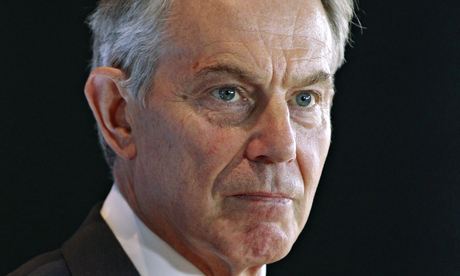Syria crisis: failure to intervene will have terrible consequences, says Blair.

Tony Blair advocated military action against the Assad regime after a sarin attack on the Ghouta district near Damascus last August killed between 350 and 1,400 people. Photograph: Blair Gable/Reuters
The world will face terrible consequences over many years to come for failing to intervene in Syria, Tony Blair has said. The former prime minister, who serves as the envoy for the Middle East quartet of the UN, US, EU and Russia, said the failure to confront President Bashar al-Assad would have ramifications far beyond the region.
Speaking on the Today programme on Radio 4 on Monday, he said: "We have not intervened in Syria. The consequences are, in my view, terrible and will be a huge problem not just for the Middle East region, but for us in the years to come."
Blair advocated military action against the Assad regime after a sarin gas attack on the Ghouta district, near Damascus, last August killed between 350 and 1,400 people. His stance placed him on the same side as David Cameron, who wanted to join the US in launching an attack on the Assad regime, but highlighted differences with Ed Miliband, who was highly sceptical about military intervention.
Speaking on the Today programme to mark the 20th anniversary of the Rwandan genocide, Blair made his remarks about the failure to take action in Syria when asked if it might still be right to take military action without domestic support.
"You'd certainly have to say that this is a dimension you have to be aware of politically," he said. "But in my view it doesn't invalidate the necessity to intervene. What you have got to compare is the fact and the consequences of intervention with the fact and the consequences of non-intervention."
The former PM, who acknowledged that many people did not want a repeat of the Iraq invasion elsewhere in the world, launched a strong defence of his decision to remove Saddam Hussein in 2003. "Supposing you had left Saddam. I think it is reasonably arguable, surely, that you would have had the so-called Arab spring come to Iraq.
"If it had come to Tunisia, Libya, Egypt, Yemen, Syria, it was going to come to Iraq and you would be facing what you are facing in Syria now in Iraq. But you can debate these issues forever. In the end what we know now – and we can see this very clearly from Libya – is that when you remove the dictatorship, that is the beginning not the end."
Blair denied that he was to blame for the continuing violence in Iraq. He said: "You have got to look at how these people are dying and who is killing them. These people are being killed by sectarian forces that want to wreck the prospects of the country getting on its feet. You can see exactly the same happening in Afghanistan."
He hailed the "quite magnificent" presidential election in Afghanistan. He said: "There is something in a way quite magnificent about the way that Afghan people, despite all the threats and the bombs, have come out and decided to vote. I would like to see us stand up for that broad majority."
Blair said he did not know when the Chilcot inquiry would publish its report into the Iraq war. "I don't know anything more than you do," he told the programme's presenter, John Humphrys.